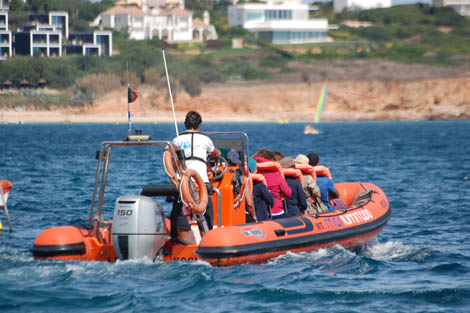 The University of Algarve was challenged on Friday to investigate the impact that the tourist activity of dolphin and whale watching already has on the Algarve sea. The challenge was launched in Sagres by marine biologist Sara Magalhães, owner of the maritime tourism company Mar Ilimitado, to the dean of UAlg, during António Branco's visit to the municipality of Vila do Bispo.
The University of Algarve was challenged on Friday to investigate the impact that the tourist activity of dolphin and whale watching already has on the Algarve sea. The challenge was launched in Sagres by marine biologist Sara Magalhães, owner of the maritime tourism company Mar Ilimitado, to the dean of UAlg, during António Branco's visit to the municipality of Vila do Bispo.
«The whale watching in the Algarve is growing too much», highlighted the biologist and businesswoman. "Right now, there are more than 30 companies operating in the region, many of which are not licensed for the activity, but there is still no study on the impact of cetacean observation", revealed Sara Magalhães, who received the dean António Branco at the company store in Porto da Baleeira, in Sagres.
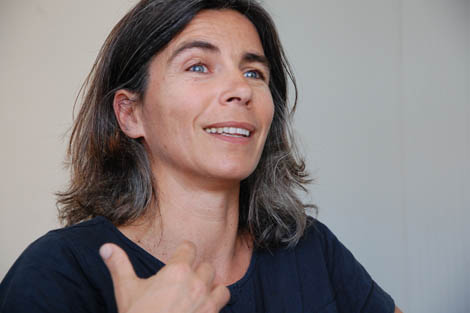
“This is growing in such a way and in such an uncontrolled way, that in Lagos there has been, since last year, a catamaran for 60 people, which charges 15 euros per person, to go dolphin watching, and this year there will already be two catamarans,” added the founder of the oldest company in dolphin watching of Sagres.
The problem, underlined Sara Magalhães, with a vast experience in research in the area of cetaceans, especially in the Azores, is that «there is a risk of mischaracterizing an activity that should be of great quality and the flag of the Algarve region».
The dean listened very carefully to the request of the biologist and businesswoman and, at the end of the visit, told the Sul Informação that «I take from here a very strong desire to see if I can find researchers at the University interested in contributing to this study of the impact that this enormous growth in activity may have on the marine ecosystem» of cetacean observation.
The owner of the company Mar Ilimitado, added António Branco, "showed in a convincing and real way" her "concern for being growing, without any kind of planning, an activity that is very important economically for tourism, but whose impact on the environment, in the sea and in dolphins, is not yet known».
Three companies will soon be watching dolphins in Sagres
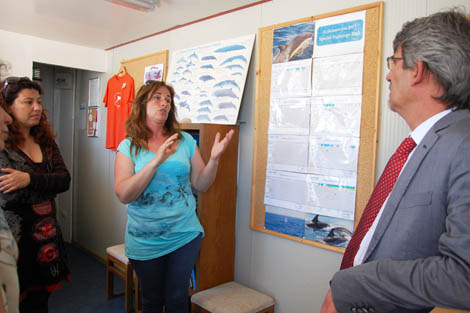
The interest of the University of Algarve in investigating the impact of the activity was one of the conclusions of a day entirely dedicated by the rectory team to the projects, investments and problems of the municipality of Vila do Bispo, thus continuing the cycle of visits that António Branco has been making to 16 Algarve municipalities, to introduce themselves and get to know the “local reality”.
In Sagres, Porto da Baleeira, after a visit to the auction managed by Docapesca, where the delegation attended – in many cases for the first time – the electronic auction of the unloaded fish, the rector António Branco then visited the two maritime-tourist companies there. Headquarters, Unlimited Sea and Cape Cruiser. Soon, even before the summer, due to the growth in activity, especially dolphin watching, the two companies will be joined by a third, with others operating in Lagos, Portimão, Ferragudo and Albufeira.
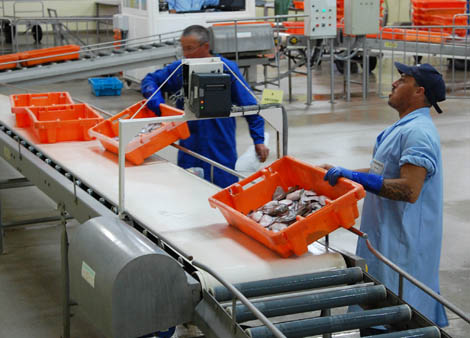 Carla Costa, owner of Cape Cruiser, stressed that, since 2010, «the number of people we take on these trips has been rising. Last year, we took 2200 people on dolphin trips», with most of the market made up mainly of British and Germans, with some Spaniards and Portuguese (less and less in the last two years). The neighboring company Mar Ilimitado, on the other hand, had around 4500 customers last year.
Carla Costa, owner of Cape Cruiser, stressed that, since 2010, «the number of people we take on these trips has been rising. Last year, we took 2200 people on dolphin trips», with most of the market made up mainly of British and Germans, with some Spaniards and Portuguese (less and less in the last two years). The neighboring company Mar Ilimitado, on the other hand, had around 4500 customers last year.
Carla Costa also underlined the seasonality of the activity, much more conditioned by the state of the sea. “From November to March, for five months, due to the storms, we couldn't even work a single day. We scheduled the departures, we postponed, postponed, but we didn't even get to do them», says the owner of Cape Cruiser, a company that employs her and her husband, all year round, and then in March integrates two more workers, reinforcing it with another two in the summer.
Next door is the Mar Ilimitado store, the oldest company dedicated to whale watching in Sagres. Sara Magalhães worked for seven years in the Azores and therefore knows the reality of that insular region very well, stressing that, there, «the companies themselves have become sentinels of the activity», creating rules and thus avoiding a destructive impact.
In the Algarve, although there is also an informal code of conduct, not all companies comply with it, making it difficult for small boats to compete in terms of prices with larger and larger boats, such as the Lagos catamarans.
Sara has no doubts that the experience of people who go to see cetaceans aboard a semi-rigid such as those on Mar Ilimitado, with a specialized guide who explains everything, is very different from those who, in heaps, between music and beers, do it on a boat for 60 people. "These big boats promote mass visits and have nothing to do with the educational tourism we do."
Investigate the tourist market and the cetaceans themselves
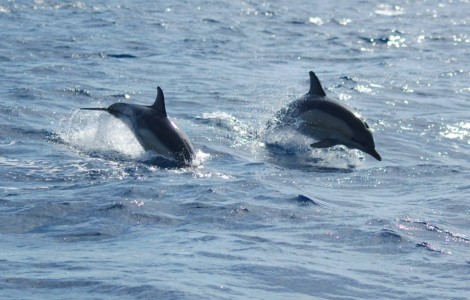 The observation of cetaceans – dolphins and whales – in the Algarve, despite the exponential increase it has had, is a relatively new activity. In fact, despite having a strong department and research centers in the areas of the Sea, Marine Biology and Fisheries, the University of Algarve does not have any researcher specialized in cetaceans.
The observation of cetaceans – dolphins and whales – in the Algarve, despite the exponential increase it has had, is a relatively new activity. In fact, despite having a strong department and research centers in the areas of the Sea, Marine Biology and Fisheries, the University of Algarve does not have any researcher specialized in cetaceans.
Hence, the challenge posed by Sara Magalhães to the dean António Branco is even more significant, with the businesswoman underlining that companies "could collaborate in this investigation of impact", as they already do, at their own expense, in relation to other research projects from several universities.
And what would you need to know? «How many companies, how many boats, how many people they take, how much money is generated, how many people are employed» the activity in the Algarve, suggests the biologist and businesswoman.
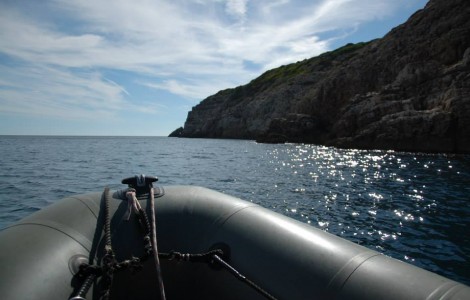 But it is also necessary to know more about the cetaceans themselves. “When I came to Sagres, I didn't even know which species could be seen here,” says Sara Magalhães. The experience has brought some surprises, such as the sighting of orcas (orcinus orca). «It is already known that the orcas that pass here are those that pass through the Strait of Gibraltar», says the biologist, a knowledge that has emerged thanks to contacts with researchers who study these cetaceans, for whose work Mar Ilimitado has contributed by providing the data that collects.
But it is also necessary to know more about the cetaceans themselves. “When I came to Sagres, I didn't even know which species could be seen here,” says Sara Magalhães. The experience has brought some surprises, such as the sighting of orcas (orcinus orca). «It is already known that the orcas that pass here are those that pass through the Strait of Gibraltar», says the biologist, a knowledge that has emerged thanks to contacts with researchers who study these cetaceans, for whose work Mar Ilimitado has contributed by providing the data that collects.
A surprise has also been the presence of the boto (phocoena phocoena), the most declining species of dolphin in Europe, as it is very coastal and therefore very susceptible to threats. “I thought there were no porpoises in the south, but the data indicate that the porpoise is the second most observed species here. And yet, it is a conservation flag in Europe, given the vulnerability of the species!».
“There is great potential here that needs to be given more attention. But you have to grab hold of this sector before it's spoiled. Until we start to protect this and organize the activity, it can happen at sea, with the excess of boats, what happened on land, with the buildings», warns Sara Magalhães.
Right there, listening to all these concerns, the rector António Branco guaranteed that he would organize, at the University of Algarve, "an internal research group" that could "reach all these areas" and provide support "to the research that is needed".
Note: This is the first of other reports on the visit of the rector of the University of Algarve to the municipality of Vila do Bispo, accompanied by the Sul Informação.


















Comments